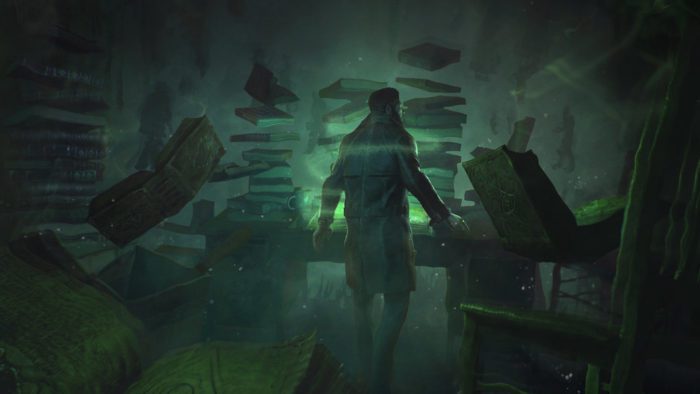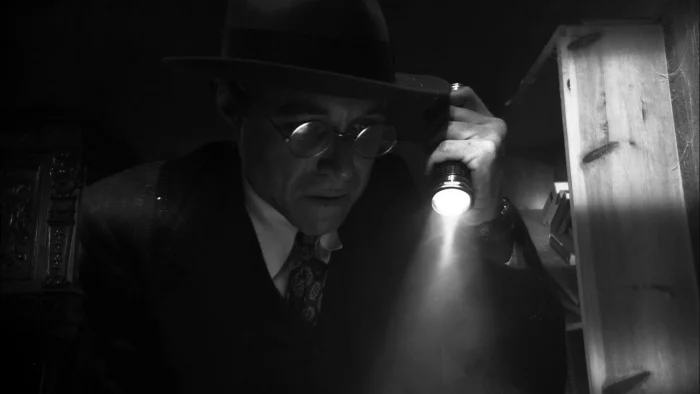From M.R.James’s forensic sense of place in various ghost stories to William Peter Blatty’s gut-wrenching prose within The Exorcist, horror literature has certainly had its fair share of chilling stories. However, the one tale that’s stuck with me like an indelible nightmare is H.P. Lovecraft’s “The Call of Cthulhu” For various reasons, the story is simultaneously a microcosm for Lovecraft’s worldview and a culmination of his nightmarish vision and mythos.
The most pertinent line that encapsulates these twin qualities comes from the following quote within the story’s opening: “We live on a placid island of ignorance in the midst of black seas of infinity, and it was not meant that we should voyage far.” [1] On the one hand, the line embodies the cautionary trope that exists as an undercurrent within horror fiction, i.e., not venturing to a particular location. And on the other hand, it gives this idea a cosmic potency by appealing to the infinite and humankind’s place within the larger scheme of the universe.

At the same time, the line speaks to a philosophical tradition that Lovecraft is aligned with, namely, the empiricist tradition, which is a theory that posits our knowledge of things comes from the senses. In particular, Lovecraft seems intellectually in lockstep with David Hume, who was equally skeptical about humankind’s quest for knowledge. In particular, Hume cited the following about ignorance within Part 11 of his posthumously published book, Dialogues Concerning Natural Religion: “All that belongs to human understanding, in this deep ignorance and obscurity, is to be skeptical, or at least cautious.” [2]
Lovecraft’s relationship with academia does extend beyond intellectual harmony with Scottish philosophers. In fact, the setup of the story comes from the death of a professor and the protagonist being swept up in his affairs. The plot point proves to be a wellspring for many reasons as to why “The Call of Cthulhu“ is so chilling.
The first appears to be quite subtle but is nevertheless quite alarming in implication. Throughout the first few pages, the narrator has an air of disbelief about the official reports of the death of his great-uncle. This potent skepticism gives rise to the fixation of a conspiracy that permeates the entire story. In fact, the narrator quite pointedly says in the story’s second part (“The Tale of Inspector Legrasse”), “I think Professor Angell died because he knew too much, or because he was likely to learn too much. Whether I shall go as he did remains to be seen, for I have learned much now.” [3] This is a quality that’s existed in prior Lovecraft stories. “Dagon” memorably ended with the following paranoid declaration from the main character, “The end is near. I hear a noise at the door, as of some immense slippery body lumbering against it. It shall not find me.” [4]
However, the difference here is an altogether human face to the conspiracy (in the form of a dedicated cult). This is a thread that Lovecraft tugs at in subsequent parts of the story.
The second aspect of the setup that makes “The Call of Cthulhu” so chilling comes from the supernatural element. A large portion of the short story’s first part (“The Horror in Clay”) is dedicated to the time Professor Angell spends with a timid and socially outcast sculptor called Henry Anthony Wilcox.
In particular, Wilcox creates a bas-relief of the central Cthulhu creature, which is based on dreams that he has through the course of the section. The introduction of the totem in question feels like a prelude to Lovecraft’s subversion of typical Western religions. In this section, the narrator describes the creature’s appearance with “a pulpy, tentacled head surmounted a grotesque and scaly body with rudimentary wings.” [5] This description flies in the face of our typical humanoid conceptions of God. Couple this with the other-worldly quality that comes from the narrator stumbling upon words such as “Cthulhu,” and you have the building blocks of something that’s quite frightening and evokes terror.

In the short story’s second part, Lovecraft puts more flesh on the bones of the ideas he sets up in the first part. Through the eyes of Inspector Legrasse, the reader learns more about the Cthulhu cult and its ancient origins. In essence, the cult is set up to worship entities known as The Great Old Ones. They’re ancient creatures who supposedly lived in a time long before humankind dominated the planet, and they reside within the hidden depths of the earth’s seas.
The cult exists within the darkest corners of the world and hopes to liberate Cthulhu from his earthly tomb. Through the testimony of a captured cult member called Castro, Lovecraft states that “The liberated Old Ones would teach [humankind] new ways to shout and kill and revel and enjoy themselves, and all the earth would flame with a holocaust of ecstasy and freedom.” [6]
In this exposition of the cult, Lovecraft’s true subversion of religion becomes apparent. In contrast to many belief systems that exist to bring order through scripture and teaching, the Cthulhu cult is dedicated to bringing about disorder and wanting to revel in a state that their ancestors enjoyed. Combined with the opening remarks about the extent of knowledge we can pursue, Lovecraft paints a pretty stark picture of humanity. In his mind, while we express a desire to expand beyond our parameters (intellectually etc), this venture will only cause us to regress to our primal and true selves as a species
The worldview feels in keeping with the intellectual idea of the State of Nature, a theory in political philosophy that posits a time before humankind came together to create a society based on political will and law. In particular, Lovecraft seems to be channeling Thomas Hobbes’s conception of the State of Nature, which he infamously declared as “solitary, poor, nasty, brutish, and short.” [7]
Like Hobbes, Lovecraft has cynicism about the state of humanity and its ability to be civil as well as last as a meaningful society. Hobbes posited that we would never cease being at war with one another, and that self-preservation fuels meaningful rules, as opposed to our ability to be rational and political animals. Lovecraft, on the other hand, points to our ignorance being a helpful quality in keeping the lid closed on the Pandora’s Box of humanity’s truly frightening and in many cases natural state.
With the existence of the cult, Lovecraft has already tipped his hat towards his cynicism about humankind, particularly with the small detail about none of the members having actually seen any of the Old Ones. Instead, they exist as pictorial representations (via bas-reliefs and idols) that are constructed via dream states. This paints an eerie picture of a typically rational race who are inferred to be controlled. But the fact remains that the narrator fears reprisal from the cult members, who are fervent in their belief seems to prove Lovecraft’s point about regression via knowledge, and susceptibility to violence in the name of blind faith.

At first, the short story’s third part (“The Madness from the Sea”) seems like a meandering mood piece that in spirit feels like a homage to the “Log of the Demeter” section in Bram Stoker’s Dracula. However, as the section goes on, it pieces together key parts that encompass Lovecraft’s worldview.
Despite not directly citing inspiration from Stoker’s novel in “Supernatural Horror in Literature” (“But best of all is the famous Dracula, which has become almost the standard modern exploitation of the frightful vampire myth”), [8] there’s a line from Dracula that can be inferred as an important source of inspiration for Cthulhu’s third section: “It almost seems as though the captain had been seized with some kind of mania before he had got well into blue water.” [9]
Perhaps Lovecraft’s signature motif as a writer in the horror genre is that the sheer knowledge of the beasts that lurk within his universe will cause humans to go mad. While this is acknowledged in many places by the sailors who stumble upon and subsequently awaken Cthulhu on a remote island, there’s also an alternative reading to this famous Lovecraftian staple.
In the section where Dracula picks off the Russian crew of the Demeter, there’s lip service given to the fact that there’s more honour in dying by committing suicide in the great blue sea as opposed to succumbing to the vampire. It’s almost as though there’s a great shame in losing one’s faculties to something that’s not human. It seems as though Lovecraft has taken this aspect from Stoker’s novel and introduced something altogether starker. Not only will human beings lose their minds when confronted with supernatural evil, but the shame of accidentally unleashing that evil might make them go mad too—“And what an age-old cult had failed to do by design, a band of innocent sailors had done by accident.” [10]
This quality of human beings inadvertently unleashing evil (whether through intonation or stumbling on a switch) has been in stories and horror fiction for a great deal of time. But in the context of “The Call of Cthulhu,” it’s the final nail in the coffin of human ignorance because when stumbling into the unknown, we do nothing but fuel our destruction. And this is perhaps the most chilling part of the short story. Fundamentally, Lovecraft is holding up a mirror to humanity and categorically finding us wanting. We cannot hope to defeat evil but instead succumb to it, allow it to poison us so that we cast aside rationality and instead regress to our primal nature.
Works Cited
[1] Lovecraft, H.P. “The Call of Cthulhu.” The Complete Fiction, edited by S.T. Joshi, Barnes and Noble, 2011, pp. 355.
[2] Hume, David. Dialogues Concerning Natural Religion. Oxford University Press, 2008.
[3] Lovecraft, H.P. “The Call of Cthulhu.” The Complete Fiction, edited by S.T. Joshi, Barnes and Noble, 2011, pp. 370.
[4] Lovecraft, H.P. “Dagon.” The Complete Fiction, edited by S.T. Joshi, Barnes and Noble, 2011, pp. 27.
[5] Lovecraft, H.P. “The Call of Cthulhu.” The Complete Fiction, edited by S.T. Joshi, Barnes and Noble, 2011, pp. 357.
[6] Lovecraft, H.P. “The Call of Cthulhu.” The Complete Fiction, edited by S.T. Joshi, Barnes and Noble, 2011, pp. 367.
[7] Hobbes, Thomas. Leviathan. Penguin Classics, 2017.
[8] Lovecraft, H.P. “Supernatural Horror in Literature.” The Complete Fiction, edited by S.T. Joshi, Barnes and Noble, 2011, pp. 1081.
[9] Stoker, Bram. Dracula. Puffin Classics, 1994.
[10] Lovecraft, H.P. “The Call of Cthulhu.” The Complete Fiction, edited by S.T. Joshi, Barnes and Noble, 2011, pp. 377.


